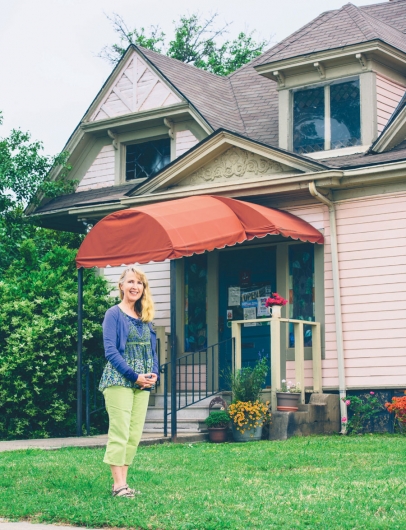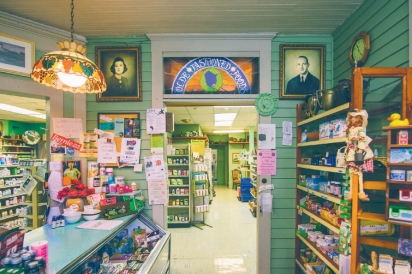A Natural Choice in the River City
Mary Adams sat at a small table in the front room of her late great uncle’s home, gazing out the window at the big, old pear tree covered in white blossoms in the first week of spring.
The late 1800s structure houses Olde Fashioned Foods, one of the first natural food stores in Arkansas and the first in Fort Smith. Mary works four days a week here, and she appreciates the history and the pace.
“I just love the old flavor,” she said. I don’t like the rush and concrete and strip malls.”
With walls painted mint green, this room now holds shelves of supplements and remedies, along with the table with two chairs and decor from decades past.
The store has been a mainstay in Fort Smith for 57 years, and a second shop opened about 20 years ago across town. A core of customers - many of them multiple generations of families - and word of mouth advertising have sustained them through the years.
The business originally started in the family home on Free Ferry Road, where Mary’s parents, the late Bill and Louise Bruce, raised their eight children. Mary was the youngest.
The couple bought items in bulk for the family - whole wheat flour, blackstrap molasses, wheat germ, brewers yeast - and her dad also sold vitamins. In the 1950s, bulk buying was an affordable way to feed themselves and their children, and their friends soon also bought products from them, operating like a personal co-op.
The family lived on 2.5 acres where they grew an organic garden, had a greenhouse, and composted their leaves. Her parents informed themselves about nutrition - reading books from Rodale Institute, an organic farm in Pennsylvania, and magazines, such as Prevention.
Her mother taught math at Darby Junior High School for many years, and her dad worked with his dad and brother in the family-owned plumbing and electrical business, until the store became his primary job.
“Those were the days when you were really considered kookie and crazy and quacky for doing this,” she said.
After about four years running the natural foods business from their home basement and garage, they moved it into the single-story house at the corner of B and 18th streets, two blocks from Rogers Avenue. Her uncle, who had no children, left the home to Mary’s parents because they cared for him in his final years.
They started the store when the food culture of Fort Smith consisted of white bread and bologna sandwiches, Dr Pepper and White Spot burgers, which Mary recalls eating. She was the sole student who took brown bread sandwiches to school. Now, she actively eats organically produced foods and avoids genetically modified foods.
A farmers market a few block away provides fresh produce to Fort Smith residents, and Mary eats a big salad every day, with many ingredients plucked from her own garden.
Raised in the business
Mary worked at the store in high school, then moved away for college and taught elementary school for a few years. She eventually returned to the Fort Smith area, where she gave birth to her three sons - now 30, 27, and 23 - at home and nursed them, fed them from the garden, and home schooled them.
In her youth, popula r store items included Elam’s natural peanut butter and Dr. Bronner’s soap. “There are very few names that are still around that used to be around,” she said.
Mary estimated 30 years have passed since her last Big Mac hamburger. She read John Robbins’ book Diet for a New America, which covered the meat industry, health, and nutrition. She’d already been changing her eating habits, but she then became a vegetarian.
She learned about nutrition and the health food business from her parents, from years spent working in the store, and from copious reading. The family also grew a big garden with corn, potatoes, beets, carrots, tomatoes, spinach, kale, peppers, and lettuce - plus more unusual things such as Jerusalem artichokes, bok choy, and Asian vegetables.
“If you’ve ever eaten really, really good food from a really good garden, you’ll never go back,” she said. “The taste is superb, not counting the nutrition. I don’t know which I do it for most, the taste or the nutrition.”
That daily big salad changes, depending on what’s available and fresh. Often, it has romaine lettuce, spinach, cilantro, parsley, arugula, and dandelion - all from her garden - plus cucumbers, radishes, and avocado.
“I make this scrumptious dressing that’s just to die for; I need to figure out some way to bottle it,” she said.
The mixture blends olive oil, balsamic vinegar, agave nectar, fresh garlic, mustard, fresh lemon, and basil, with Herbamere - sea salt infused with organic, fresh herbs, and vegetables.
Intentionally caring for one’s body is vital, Mary said.
“It’s your greatest possession. Besides the spiritual, our bodies will only last us as long as we take care of them. So, to me, it’s a priority,” she said.
Across town shops
The original Olde Fashioned Foods shop in historic Fort Smith carries supplements, shelf-stable foods, bulk items, and a bit of produce and cold items. The second store on Phoenix Avenue on the east side of town is bigger and carries more produce and frozen and refrigerated items. Most of the produce comes from California, though she sources other items locally when she can, such as asparagus and apples. The organic meat and eggs there are sourced from local farms.
“We try to do local as much as possible, and as much as there’s the demand for it,” Mary said.
Popular items these days include Amy’s Kitchen frozen meals, chips, trail mixes, and kombucha, or fermented teas. She’s also seen more customers who are vegetarians or vegans (eating no animal-derived products).
“Mostly, people want something quick and easy,” she said. “They’re wanting real, convenient, healthy foods. But they want it so they don’t have to spend time in the kitchen.”
With abundant information on the internet, people come in now with thoughtful questions and active approaches to their own health. They are still interested in supplements, plus probiotics, raw proteins, detoxes and cleanses, essential oils, and aromatherapy. Many are interested in preventing conditions that run in their family, or simply living a healthier life.
“I just see shoppers being more discerning in some ways,” she said. “I ‘m always pleased, anyway, when a customer comes in and they’ve done their homework.”
Mary doesn’t prescribe anything, but only offers ideas for how she’s handled specific ailments. Lately, people are concerned about inflammation, which can be triggered by processed foods, caffeine, meat, white sugar, white flour, and a lack of fruits and vegetables. “Most of our degenerative diseases are created by inflammation,” she said. “A vegetarian diet cuts out a tremendous amount of inflammation.”
In the natural food business, “hippies made the business known, but it’s the yuppies who have carried it,” she said.
The clientele at he r stores has changed somewhat over the years, she said. In addition to the young professionals who can spend $200 per visit on supplements, many customers also rely on food stamps. Here, they can get bulk herbs, beans, and rice, as well as produce they don’t grow themselves.
“You can still be healthy on a shoestring budget,” Mary said.
Continuing a family legacy
Her mom’s antiques collection, plus several pieces added by Mary - such as irons, canning jars, dishes, glassware, teapots, and kitchen tools - decorate the high shelves that border the walls.
The store features a fireplace and original stained glass windows. Another stained glass piece bearing the store’s name was custom made. It hangs above the front register, flanked by portraits of her mother and father.
The original store has served generations of customers from this neighborhood of largely lower-income residents. Some parents and grandparents have shopped here for years, and the grandchildren are now customers.
Mary’s dad died in 1995, and she often heard testimonials about how he helped people improve their health and change their life. The volume of those stories has dwindled in the past couple of years.
“I believe this business has been important because of education, because of empowerment, because of helping people to awaken and become enlightened and take responsibility, treat themselves with love and respect and care, and to create a healthy generation to follow,” she said.
Mary is proud to maintain this business that her parents started, and she treasures that it survives and thrives. Her sons and niece also work with her, along with employees who’ve been a part of it for more than 20 years.
“I’d like for it to be around another 57 years,” she said.






